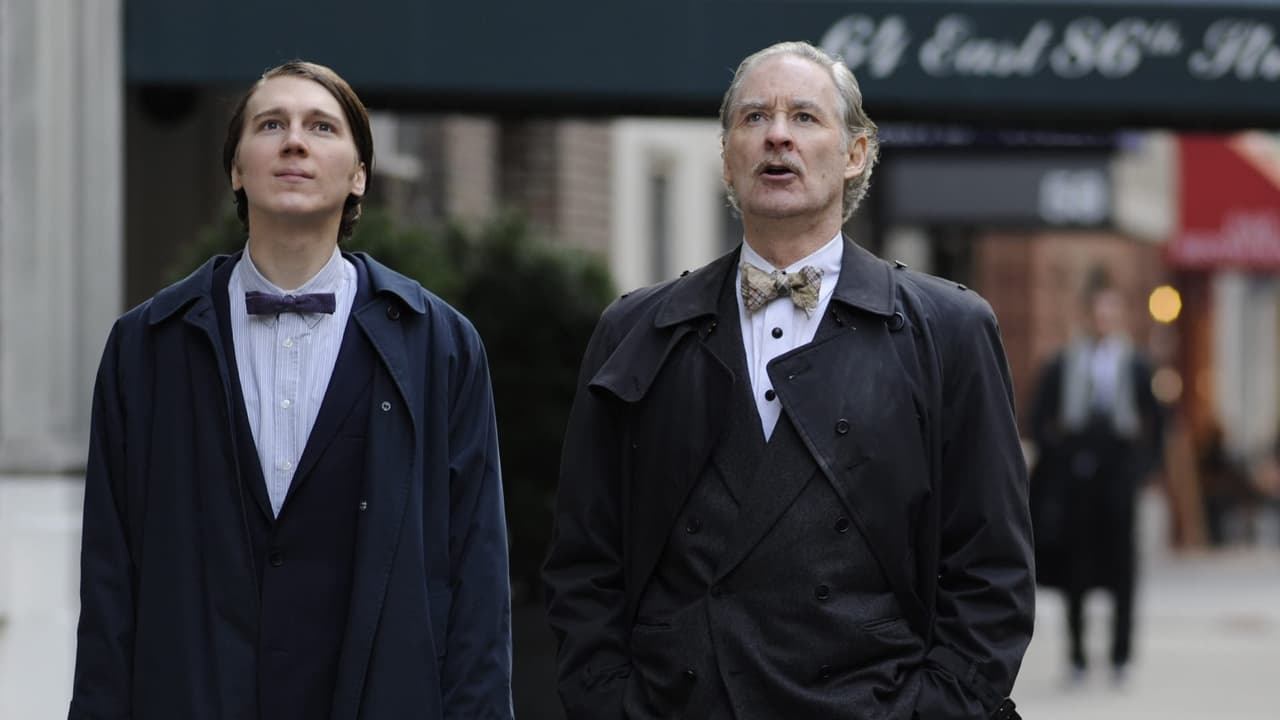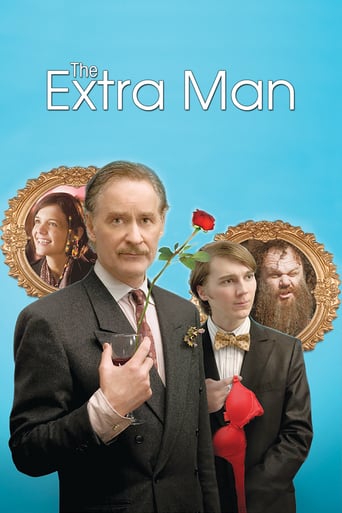AniInterview
Sorry, this movie sucks
HomeyTao
For having a relatively low budget, the film's style and overall art direction are immensely impressive.
Sammy-Jo Cervantes
There are moments that feel comical, some horrific, and some downright inspiring but the tonal shifts hardly matter as the end results come to a film that's perfect for this time.
Patience Watson
One of those movie experiences that is so good it makes you realize you've been grading everything else on a curve.
MBunge
With two directors, three screenwriters and the work of the original novelist to draw on, the surprising thing about The Extra Man is its paucity of wit, insight and cleverness. Too many cooks spoil the broth, but usually because they throw too much into the pot. This movie is more like stone soup. The main character is entirely defined by obsessions with 1920s literature and cross dressing, neither of which are defined, explained, resolved or lead anywhere. Kevin Kline is wasted in a character that feels incomplete, like half his scenes were edited out of the film, and then is completely neutered of all his politically incorrect personality. It attempts to take on the concept of poverty-stricken existence on the fringes of great wealth, then demonstrates again and again and again that it has no clue what poverty is or what it means. The feeble attempts at comedy here peak with John C. Reilly going a funny voice. This film includes some of the most aggravating and amateurish narration I've ever heard, tries to turn that horrid voice-over into a joke, then continues on with it after the punchline. A great cinema adaptation will make you want to run out and read the book. The Extra Man did make me want to rush and buy up all the available copies of the original work, but so I can pile then up on my lawn and burn them.Louis Ives (Paul Dano) is an awkwardly quiet and proper prep school teacher who acts more like a withdrawn and socially inept young student. He's introduced to the audience fantasizing about being The Great Gatsby and then loses his job after being caught trying on a bra in the teacher's lounge. After spending several months doing nothing, because prep school teachers apparently earn enough to make that possible, he decides to move to Manhattan and rents a room (more like a hallway) from Henry Harrison (Kevin Kline). Sexist, rigid, imperious and simultaneously pretentious and down-to-earth, Harrison claims to be a teacher and a playwright but what his life truly revolves around is being an "extra man". In New York society, wealthy widows are in need of men to escort them to events and fill out the spare chairs at dinner parties.That's the setting of this film. The story, such as it is, deals with Louis' triple efforts to comprehend his sexual identity, date an attractive co-worker (Katie Holmes) at the magazine where he lands a job, and sloooooowly enter into Henry's world as something of an apprentice "extra man". Of the first, Patti D'Arbanville's nuanced portrayal of an aging sex worker is the only highlight. Beyond that, the whole plot line fizzles out and leaves the viewer with no idea if Louis straight, gay, transvestite or what. Of the second, Louis' pursuit of his co-worker defies every bit of his personality, has no point and concludes with Louis counter-intuitively abandoning the pursuit. Of the third, these filmmakers do nothing to delve into the world of "extra men" beyond anything but the shallowest depths and leaves the audience with no better understanding of the culture and its participants than when the movie began.The closest The Extra Man comes to humor is a bit involving Kline and one of those pocket dogs that are the size of cats. The rest all smacks of storytellers who can't tell the difference between clever and funny, while not being all that clever in the first place. A character, or that damnable narration, is always telling the audience things about other characters' background and motivation. That's usually the surest sign of lazy, incompetent writing. Here, though, it strikes me more as some sort of meta-commentary on the whole clichéd conceit, but done by people who've only heard of the whole "meta" concept and don't actually know what it is. There's almost nothing of any value in this thing.Let me give you an example of how the writing in The Extra Man isn't nearly as smart as it was intended to be. Toward the end of the movie, Louis asks his co-worker to go with him to a wedding. She turns him down. That's followed by a scene of the co-worker and her boyfriend where she's essentially shamed into reconsidering her decision. That scene is the only one in the whole production without Louis. No other character has a standalone scene like that where Louis isn't at least present. This entire motion picture is centered on and orbits the character of Louis Ives. If that's the kind of story you're telling and then you, all of a sudden, have to throw in a scene that totally breaks from that convention in order to advance the story, you're not actually writing. You're swinging the Almighty Plot Hammer. Big Hollywood studios produce a lot of loud, dumb, self-indulgent crap. Independent cinema produces a lot of quiet, dumb, self-indulgent crap. If you don't want to admit that, you might fool yourself into enjoying The Extra Man. If you prefer the cold light of truth to ego-gratifying delusion, keep looking for something better.
Guy Lanoue
This little gem is structured and unfolds like an F. Scott Fitzgerald novel (complete with continual Gatsby-esque references to Hamptons-like settings), which we are informed at the very beginning when the two principal characters, Kline and Dano, are introduced as lovers of and teachers of Gatsby period literature. I don't quite understand some of the negative comments in other reviews, since this offbeat character study is well-scripted and certainly well executed with Dano, Kline, and Riley. The only problem I can see is the lack of a back story at the beginning that explains the many quirks upon which rest the narration and the character development. SPOILER: Are we so jaded by Hollywood banality that we can't wait till the end of the film to see that Kline's character Henry has been telling the truth about himself all along, that he is a Rosenkavalier (the theme is underscored by the subplot whether or not the young Louis will marry the old rich woman's niece)? The end, in fact, cleverly establishes the ambiguity that seems to dominate the movie, but in fact is a precise and well-targeted resolution. In fact, it is the contrast between the apparently shallow lifestyle to which he aspires with all his parasitical schemes and his brutal honesty throughout (for example, admitting that he is manoeuvring his roommate Dano/Louis Ives merely to get a ride) is what carries the psychological mechanics of the movie. This is made clear at the end by several scenes and twists, which I won't reveal here. In the end, we see that the socialite salon society to which the Extra Man aspires (extra, as in making up the balance in the boy-girl equilibrium of dinner parties) is not really lampooned nor the subject of parody, but is in fact a viable space where people can be just as real as anyone else who wears jeans and baseball caps – vain and narcissistic, yes, but also generous, honest, self-sacrificing and especially capable of living according to a strict code that obliges self-honesty in the midst of meaningless rituals of chivalric obligation and politeness. This film can also been seen as a kind of Bildungssroman, a voyage of exploration of a young acolyte at the hands of an older mentor, with a twist of course, since the young man in this case explores sexual paths not sanctioned by the older Kline. Yet in the end we are not sure if the older mentor or the younger disciple or even the court jester (Riley) is the motivating force for self-awareness. The film works on many levels, obviously, and this in large because the minimalist script is very efficient and in part because the actors are great. Worth the time and intellectual investment (helps to watch at least partly aware and awake). Kline should be applauded for an intelligent performance that transforms quirks, weirdness, and eccentricity into a believable portrait of warped but very real idealism.
namashi_1
Shari Springer Berman & Robert Pulcini's 'The Extra Man' is average stuff... that had the potential to come out as a pure gem. But, the writing is weak, especially in the final 30-minutes.'The Extra Man', based on a novel, tells the story of a failed playwright, who develops an odd mentor relationship with a Louis Ives, a troubled, cross-dressing, aspiring writer to whom, he sublets a room in his New York apartment.The idea, is fairly interesting, and it does hit the right points in the beginning. But, after a point, the writing begins to lose. The pace suddenly dips, and even the culmination comes out bland. Shari Springer Berman & Robert Pulcini's adapted screenplay is flawed. Their direction is just about okay.Performance-Wise: Kevin Kline is damn good. He is the life of the show. Paul Dano does reasonably well, while John C. Reilly sports a hideous get-up. Katie Holmes is alright. Alicia Goranson is fair.On the whole, an average effort, that had great potential, but sadly, gets wasted due to weak writing. Watch it if you must!
imastringbean
i saw this movie because I am a John C Reilly fan, however, much to my chagrin, even with his minor role, this gave me many genuine deep "what the f%$#" laughs. I also like Paul Dano and think he really played this character well. His look of horror at his woman self was priceless, especially when he had to dodge flying Christmas ornaments from harry. it was quirky yet boldly in-touch and the humor spoke to me. It was a movie that I watched by myself on a lonely night and it certainly took me out of my head.this is the only movie I have ever watched that I was motivated to write the review for.

